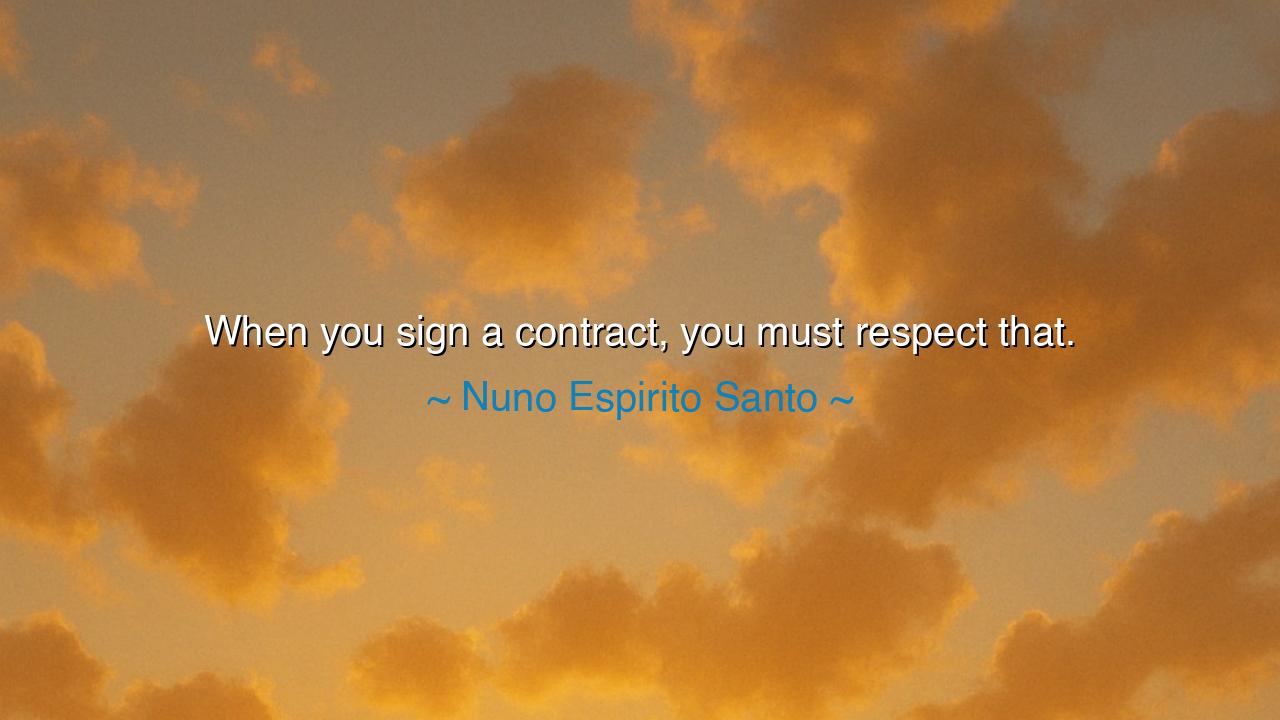
When you sign a contract, you must respect that.






The words of Nuno Espírito Santo—“When you sign a contract, you must respect that”—carry the quiet thunder of ancient virtue. Though he speaks in the modern tongue of sport and business, the spirit of his words reaches back to the dawn of civilization. In them we hear the echo of an eternal truth: that honor binds a man more firmly than ink, and that one’s word, once given, becomes a sacred thread tying soul to deed. His statement is not merely about agreements or obligations—it is a meditation on integrity, discipline, and the moral gravity of one’s promises.
In the age of the ancients, contracts were not pieces of paper but spoken oaths before gods and men. The Greeks called this concept pistis—faith, trust, the binding force that held society together. When a man gave his word, he gave his spirit; and to break that word was not merely to offend another, but to wound the order of the world itself. Nuno’s wisdom revives this old truth in an age that too often forgets it. He reminds us that to respect a contract is not a legal duty alone, but a spiritual one—a reflection of one’s character, one’s respect for others, and one’s respect for oneself.
The contract, in its truest sense, is not just an exchange of goods or services—it is a covenant of trust. When Nuno speaks of respecting it, he speaks as a man who understands that the foundation of any noble endeavor—whether in sport, art, or life—is built upon loyalty and accountability. To sign one’s name is to seal one’s honor. In the world of football, where passion runs high and fortunes rise and fall with every match, Nuno’s words ring especially true. He reminds players and managers alike that greatness is not only achieved through victory on the field, but through the discipline of commitment off it. A true professional honors the promises he has made, even when circumstances tempt him to abandon them.
There is an ancient story that illustrates this principle. In the Roman Republic, a general named Regulus was captured by the Carthaginians during the Punic Wars. They sent him back to Rome to negotiate peace, under oath that he would return if the Senate refused. When Rome rejected the terms, Regulus—though he knew he would be tortured and killed—kept his word and went back to Carthage. His enemies mocked him, but history remembers him not as a fool, but as a man of incorruptible honor. Regulus understood, as Nuno does, that the worth of a man is measured not by his comfort, but by his fidelity to his word.
Today, the world often worships expediency over integrity. Contracts are broken for profit, promises abandoned when convenient. Yet what is gained in the moment is lost in the soul. A man who breaks his word gains wealth but loses respect, and without respect, even the richest life becomes hollow. Nuno’s words stand against this erosion of character. They remind us that commitment is a test of virtue, and that to respect one’s word—especially when it is hard—is the mark of strength, not weakness.
In Nuno’s own career, his philosophy has been visible in his calm, steadfast demeanor. Whether as a player or a coach, he has embodied the principle that leadership is not loud, but loyal. His teams are built not merely on skill, but on trust—a trust that begins with keeping one’s word. When he says, “When you sign a contract, you must respect that,” he is not speaking only of players or clubs; he is addressing every man who has ever made a promise, every soul who has ever given their name to an oath. For when we commit ourselves, we are writing not just on paper, but on the tablet of our own conscience.
The lesson of his quote, then, is timeless: to live with integrity is to live with peace. Let your promises be sacred; let your word be unbroken. If you pledge your hand, stand by it. If you make an agreement, fulfill it with dignity, even when it costs you something dear. For in honoring your commitments, you build a foundation of trust that will outlast wealth and fame.
So, my child, when you give your word—whether in a contract, a friendship, or a vow—remember the weight of it. Speak with care, and sign with conviction. Do not bind yourself lightly, but when you do, stand firm as stone. For the world changes, fortunes shift, and men rise and fall—but the one who keeps his word, who respects his commitments, remains eternal in the eyes of all who value truth. Such a person may walk silently, but his integrity resounds through the ages, like an unbroken oath whispered into the heart of time.






AAdministratorAdministrator
Welcome, honored guests. Please leave a comment, we will respond soon